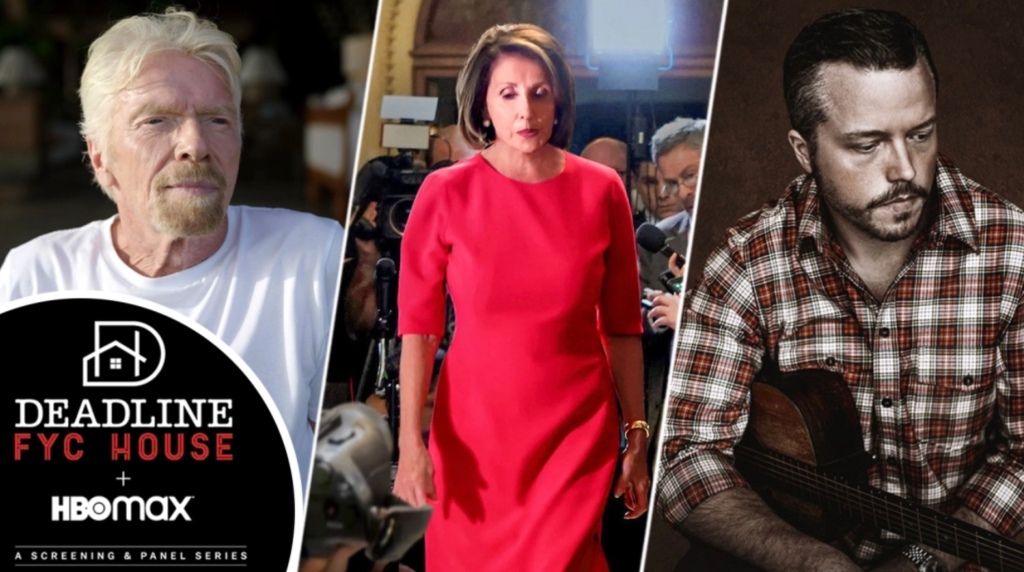
One unpredictable part of making any documentary about a person is showing them a cut.
While the five documentary filmmakers taking part in the session “HBO Doc Panel: Portraits” as part of the Deadline FYC House + HBO Max screening and panel series had tackled a wide range of subjects with various approaches, they agreed on that nerve-wracking final step.
Sam Jones, director-producer of Jason Isbell: Running With Our Eyes Closed, said he deliberately put a key interview segment toward the top of the film, knowing Isbell would register it when he watched. In that moment, “Jason says, ‘I have to come to terms with things that don’t make me look cool as an artist’ because that’s the opposite of making art is worrying about your self-image,” Jones said about his fly-on-the-wall look at Isbell’s creative process. He added with a chuckle, “I wanted to remind him that he wasn’t gonna look cool.”
Alexandra Pelosi, a veteran filmmaker who decided to make her mother, House Speaker Nancy Pelosi, the subject of Pelosi in the House, said feedback started coming in even based just on the film’s trailer. “I showed it to her and she said, ‘You should take out this, this, this.’ I said, ‘Mom, it’s a little late for that. It’s on YouTube.”
The attack on the U.S. Capitol on January 6, 2021, helped influence her decision to make the film. On a broader level, Pelosi said, “I had to make this movie because I’ve been following my mother for 30 years with a camera.”
Ed Perkins was a unique case among the quintet onstage because The Princess, which he directed, uses archival material rather than talking heads to portray Princess Diana. Even without a living subject’s opinion to worry about, Perkins said the sheer scale of the undertaking was intimidating. “She probably had more footage of herself than anyone else alive and the story we were trying to tell spanned 17 or 18 years,” Perkins said. “My job was in part to watch everything. It’s very dangerous when you start these projects to have too much of a preconceived notion about the story you’re trying to tell.”
After spending up to 12 hours a day poring over each frame of available footage, he said, the subtlest gesture would start to stand out. “It was almost like being a drama director and you’re looking for body language … She’s like a silent movie star.”
Edward “Buck’ Buckles, Jr., director-producer-writer of Katrina Babies, said he didn’t feel the film was truly finished until the people of New Orleans saw it last year. The responses from the community included heartfelt comments like “we needed this” and “I’m healing from this,” which eased his self-described survivor’s guilt. Buckles, who was 22 when he started the film, was able to safely evacuate as Hurricane Katrina ravaged his native city in 2005. He wanted to examine the effect on children in the city, a dimension of the disaster as yet unexplored.
“It was supposed to be a nine-month project,” he said, but many of the early interviews turned intensely emotional. As the tears flowed and emotions surfaced, “that added years into this project but it also gave me validation that this story needed to be told.”
Chris Smith. director of the four-part Branson, said the depiction of the multi-faceted billionaire fell into place once it was clear that Branson’s trip into space would provide a narrative framework. “Oh, this has a reason to exist now,” Smith recalled thinking once the space mission was confirmed. “It clicked for me that we could tell the story of him looking back at everything,” with the implicit notion being it could serve as a thoughtful reflection on his life in the event of an interstellar event. And Branson’s reaction? “There were some things he didn’t love,” Smith shrugged, “but he thought it was fair.”
Click on the video above to watch the conversation.
To watch more videos from the Deadline FYC House + HBO Max event series, click here.













